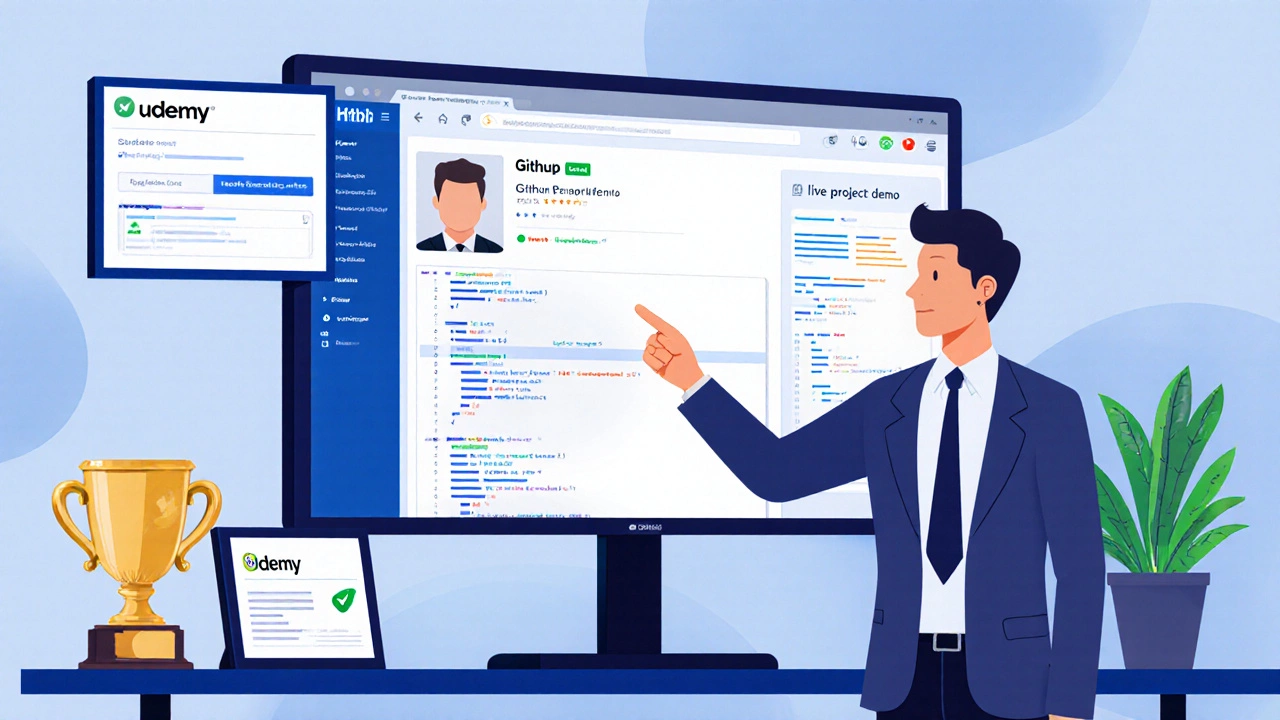Is a Udemy Certificate Respected? A Deep Dive for Indian Job Seekers

When you see a badge that says Udemy certificate is a digital credential awarded after completing a Udemy course, typically featuring the learner’s name, course title, and completion date, the first question is often the same: does anyone actually care?
How Udemy Issues Its Certificates
Udemy’s platform is built on a massive marketplace model. Instructors design courses, set prices, and upload video lessons. Once a learner finishes all required video sections, quizzes, and any optional assignments, Udemy automatically generates a PDF certificate. The document includes the learner’s name, the course name, the instructor’s name, and a unique verification URL.
The verification URL links back to Udemy’s database, allowing anyone with the link to confirm that the certificate is genuine. However, Udemy does not partner with any official accreditation bodies, and the certificates are not tied to a national qualification framework (like the NQF in India).
What Employers Really Look For
Recruiters in India, especially in tech, finance, and digital marketing, prioritize three things: proven skills, practical experience, and credibility of the credential. A certificate can act as a signal, but its weight depends on several factors:
- Instructor reputation - courses taught by industry veterans or recognized experts carry more clout.
- Course depth - longer, project‑based courses (40+ hours) are seen as more rigorous than short, theory‑only sessions.
- Verification ease - the ability to click a link and see the certificate validated on Udemy’s site helps reduce doubt.
- Industry alignment - if the skill set matches a job posting’s requirements, the certificate becomes a useful proof point.
In a survey of 250 hiring managers across Bangalore, Delhi, and Mumbai (2024), 42% said they would consider a Udemy certificate if the course was taught by a well‑known professional and included a capstone project. The same study found that 68% preferred certificates from platforms that had formal partnerships with universities or industry bodies.
Udemy vs. Other Online Certification Platforms
| Platform | Accreditation | Typical Course Length | Employer Recognition (India) | Cost Range (INR) |
|---|---|---|---|---|
| Udemy | None (Marketplace) | 5-40 hrs | Low‑to‑Medium | ₹500-₹10,000 |
| Coursera | University‑backed, some recognized micro‑credentials | 20-80 hrs | Medium‑to‑High | ₹3,000-₹25,000 |
| edX | University‑backed, offers verified certificates | 15-70 hrs | Medium‑to‑High | ₹2,500-₹20,000 |
| LinkedIn Learning | Industry‑focused badges, integrates with LinkedIn profiles | 3-30 hrs | Medium | ₹1,200-₹8,000 |
| PMI (Project Management Institute) | Globally recognised professional body | 35‑hrs (PMP exam prep) | High (especially for project roles) | ₹7,000-₹14,000 |
Notice how Udemy’s lack of formal accreditation places it at the lower end of the “Employer Recognition” column. That doesn’t mean it can’t be valuable - it just requires extra effort to prove the skill.

Specific Considerations for the Indian Job Market
India’s tech hiring landscape is rapidly evolving. Companies like Infosys, TCS, and Accenture have begun acknowledging upskilling initiatives, but they still favor certifications that map to recognized frameworks such as the National Skill Qualification Framework (NSQF) or industry‑specific bodies like the Institute of Electronics and Telecommunication Engineers (IETE).
That said, a Udemy certificate can be a strong differentiator when you pair it with:
- GitHub repositories that showcase real‑world projects.
- LinkedIn endorsements from peers or instructors.
- Portfolio case studies that explain the problem, solution, and impact.
For roles in digital marketing, data analysis, or UI/UX design, many startups treat a Udemy‐based skill badge similarly to a short‑term vocational course, especially if the candidate can demonstrate applied knowledge during an interview.
Tips to Make Your Udemy Certificate More Credible
- Choose courses with high enrollment and strong reviews - look for a rating above 4.5 and at least 10 000 students.
- Complete the optional project - upload the deliverable to a public repo or personal website.
- Link the verification URL on your resume and LinkedIn profile.
- Combine multiple related Udemy courses into a mini‑specialisation and list them as a bundled skill set.
- Get a mentor’s endorsement - ask the instructor or a senior colleague to write a brief recommendation.
When these steps are in place, the certificate shifts from a mere PDF to a verifiable proof of competence.

Common Misconceptions and Pitfalls
Many learners assume that any certificate will automatically open doors. In reality, the following mistakes can dilute credibility:
- Relying on cheap, low‑quality courses - a $10 course with no assignments adds little value.
- Ignoring the verification link - omitting it makes the certificate look like a self‑issued document.
- Overloading your resume - listing ten short Udemy badges can appear desperate; focus on the most relevant ones.
- Not staying current - tech stacks evolve quickly; a 2019 course on Angular 2 may be outdated.
Address these issues and your Udemy certificate becomes a strategic asset rather than a decorative extra.
Quick Checklist: Is Your Udemy Certificate Ready for the Workplace?
- ✅ Course length ≥ 10 hrs and includes a hands‑on project.
- ✅ Instructor is recognized in the industry (e.g., a certified AWS Architect).
- ✅ Verification URL is active and shared on resume/LinkedIn.
- ✅ Project showcased on GitHub or personal portfolio.
- ✅ Endorsed by at least one senior professional.
If you tick all the boxes, you’ve turned a simple Udemy badge into a credible, job‑ready credential.
Frequently Asked Questions
Do Indian employers recognize Udemy certificates?
Recognition varies. Large IT firms tend to prioritize skills and project evidence over the certificate itself, while smaller startups may view a well‑chosen Udemy badge as a positive signal, especially when paired with a portfolio.
How can I verify my Udemy certificate to an employer?
Each Udemy certificate includes a unique URL. Copy that link into your resume or LinkedIn. When clicked, it shows the learner’s name, course details, and Udemy’s validation page.
Is a Udemy certificate worth the cost?
If the course is high‑quality, includes a project, and aligns with a skill you need for a job, the investment can pay off in higher employability. Pair it with real work samples for the best ROI.
How does a Udemy certificate compare to a Coursera specialization?
Coursera often partners with universities, offering accredited micro‑credentials that many recruiters recognize. Udemy focuses on industry‑practitioner courses, so it shines when the instructor is a known expert and the skill is niche.
Can I use multiple Udemy certificates together?
Absolutely. Group related certificates (e.g., Python fundamentals, data visualization, and Flask web development) into a competency suite on your resume. Highlight the combined skill set rather than each badge individually.

Post-Comment